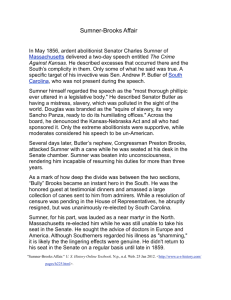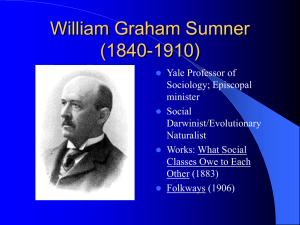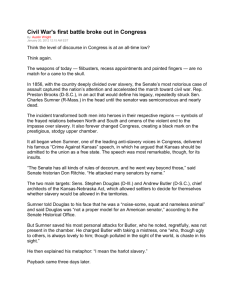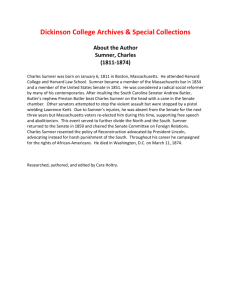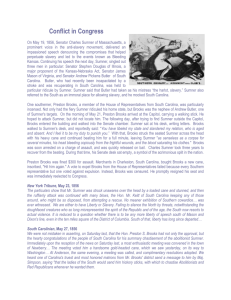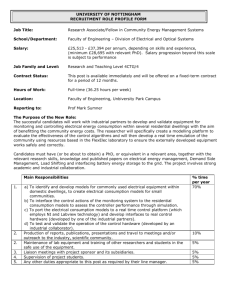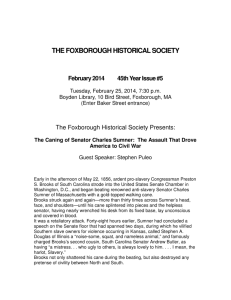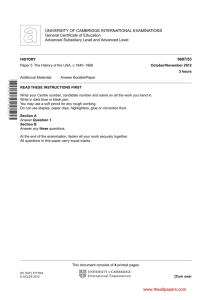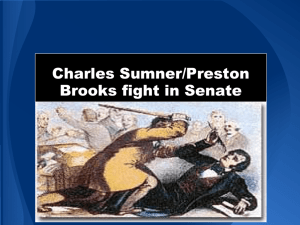National Review 2 25 2013 Florence King The Caning copy
advertisement
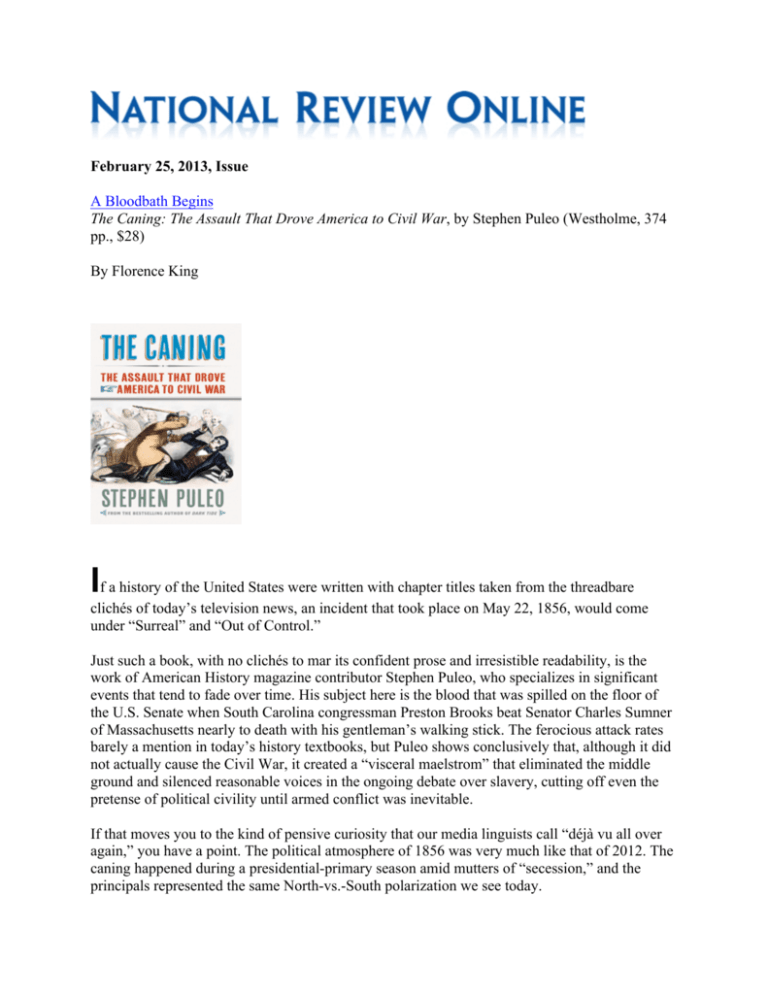
February 25, 2013, Issue A Bloodbath Begins The Caning: The Assault That Drove America to Civil War, by Stephen Puleo (Westholme, 374 pp., $28) By Florence King If a history of the United States were written with chapter titles taken from the threadbare clichés of today’s television news, an incident that took place on May 22, 1856, would come under “Surreal” and “Out of Control.” Just such a book, with no clichés to mar its confident prose and irresistible readability, is the work of American History magazine contributor Stephen Puleo, who specializes in significant events that tend to fade over time. His subject here is the blood that was spilled on the floor of the U.S. Senate when South Carolina congressman Preston Brooks beat Senator Charles Sumner of Massachusetts nearly to death with his gentleman’s walking stick. The ferocious attack rates barely a mention in today’s history textbooks, but Puleo shows conclusively that, although it did not actually cause the Civil War, it created a “visceral maelstrom” that eliminated the middle ground and silenced reasonable voices in the ongoing debate over slavery, cutting off even the pretense of political civility until armed conflict was inevitable. If that moves you to the kind of pensive curiosity that our media linguists call “déjà vu all over again,” you have a point. The political atmosphere of 1856 was very much like that of 2012. The caning happened during a presidential-primary season amid mutters of “secession,” and the principals represented the same North-vs.-South polarization we see today. A Boston intellectual whose friends included Thoreau, Longfellow, and Emerson, Charles Sumner stood six-foot-four and was as handsome as a leading man, but he was far less imposing on the inside. Unable to please his impossibly demanding father, he overcompensated with a pose of superiority and a resolve never to let his mask crack. His lack of “imagination, wit, and a sense of humor” was noted by Oliver Wendell Holmes. “He was totally put off-balance by goodnatured banter,” said one friend, “and when anyone tried to joke with him, his expression was one of total astonishment.” He was especially afraid of being trapped at parties by well-bred, sophisticated women who were good at small talk. Whenever his friends saw him in such situations, they made bets on how long it would take him to extricate himself. As paternal rejection continued to eat away at his grandiose self-image, he was drawn to politics as a route to the acceptance and recognition he craved. One of the last of the moderate Whigs, he was anti-slavery and, as a Free Soiler, he was against the extension of slavery, but his supporters felt that his aristocratic, statesmanlike demeanor would mollify the South. The northern electorate was almost solidly composed of “Union men” who dreaded the possibility of secession, and Sumner was considered representative of this opinion when he was named to the Massachusetts Senate seat recently vacated by Daniel Webster (who had famously sworn, “Liberty and Union, now and forever, one and inseparable”). Sumner was lucky that senators at this time were chosen by state legislatures, because he never could have won a popular vote. “Brilliant in some ways, he possessed little in the way of street smarts and instinctual savvy,” writes Puleo. “The inspirational music of Sumner’s anti-slavery message was often drowned out by the tone-deaf insolence of its messenger. . . . His language, at once stinging and eloquent, roiled the chamber with a rancorous turbulence.” But Sumner, consumed by a driving need to hurl invective to assuage his buried resentments, was “oblivious to the wounding power of his venomous words.” The inspirational music of his anti-slavery message changed keys when he abandoned statesmanship and its compromises for the radical stance of abolition. It did not seem so radical to Sumner, because it was also the stance of his progressive, liberal friends, including Ralph Waldo Emerson, who praised John Brown as “the new saint . . . awaiting his martyrdom, and who, if he shall suffer, will make the gallows glorious like the cross.” The abolitionists demanded an immediate and unconditional end to slavery without compensation to slave owners that — equally important to mercantile New England — stood to bankrupt the Yankee textile mills that spun the cotton picked by southern slaves. But Sumner, in tones of “sneering arrogance that dripped with condescension,” called the southerners and their northern supporters “Lords of the Lash and Lords of the Loom” and alienated both, savoring the image of himself as a martyr standing alone against all injustices wherever they existed. His martyrdom of May 22, 1856, occurred after his five-hour speech against the KansasNebraska Act, which let territories vote on whether to be slave or free. Sumner was already notorious for his personal attacks on public men, and his father-substitute on this occasion was the venerable Senator Andrew Butler of South Carolina, a leading supporter of the act. Butler was not present, owing to a recent stroke that had left him with partially paralyzed facial muscles — and just as well, said Sumner, who delivered his own 12,000-word speech from memory, for Butler was capable of voicing nothing but “incoherent phrases that discharge the loose expectorations of his speech.” It was too much for Butler’s kinsman Preston Brooks. Two days after the speech, the South Carolina congressman waited for the visitors’ gallery to be clear of ladies, and then marched up to the desk where Sumner was still seated and struck him over the head with all his might. Blow after blow rained down, opening Sumner’s scalp and exposing his skull. The cane broke midway into the fray, so Brooks continued the assault with the heavy metal knob; the tall, 45-year-old Sumner made no attempt to rise and defend himself against the short, 36-year-old Brooks. The author maintains that, while Sumner’s long legs were stuck under his desk, all he needed to do was push back on his roller chair. Why didn’t he? Was he embracing the martyrdom? What happened next transformed slavery from a political issue to “a titanic moral struggle replete with religious overtones.” Someone (we aren’t sure who) collected the slivers of the broken cane and had them made into rings, bracelets, and necklaces — “like sacred relics,” said the flattered but astonished Brooks — while thousands across the South sent him new canes the way today’s Americans send teddy bears. Sumner, who was carried home to his Washington rooms instead of to a hospital, left a trail of blood for his friends to preserve and enshrine. His soaked frock coat was displayed to celebrities such as the former slave Frederick Douglass, who was granted permission to touch it reverently. Southern newspapers reacted predictably, characterizing northern men as either arrogant or effeminate. “Fanatics of the male gender, and weak-minded women and silly children, are horribly affected at the thought of blood oozing from a pin scratch.” “Cowhide the bad manners out of them and good manners into them.” “They have grown saucy, and dare to be impudent to gentlemen. They must be lashed into submission.” (Inevitably, one southern paper even praised Brooks’s chivalry for waiting until all the women had left the visitors’ gallery.) The northern reaction, while also enraged, contained a self-congratulatory note that we still hear today whenever liberal urbanites discuss the South: In 1856, the word was “barbarian”; today, it is “redneck”; but it’s still the same stereotype, and there’s no slavery around today to justify it. It lives on, says the author, because “both sides still believe the other does not understand their values.” As Henry Ward Beecher said when he heard about the caning: “The symbol of the North is the pen; the symbol of the South is the bludgeon.” The most important result of the caning was its astonishing effect on the election of 1856. The Democrats nominated the pro-South James Buchanan and his Kentucky running mate; the Know-Nothings ran Millard Fillmore; and the new party, the Republicans, chose explorer John Charles Frémont to run on their anti-slavery platform. The South had threatened to secede if the Republicans won, but no one expected the Republicans to get more than a token vote; yet a combination of New England “Union men” disillusioned by the caning plus the many new, less emotionally involved voters in western states and territories gave the Republicans 33 percent of the popular vote. “The Republicans have suffered a glorious defeat,” said one Philadelphia editor. “They have not got a Presidency but they have got what is better — a North.” There is much, much more, but I don’t have the space to go into it except to say that this is the best book I have read in years, packed with fascinating details of the kind that seldom make it into lesser works. There is Chief Justice Roger Brooke Taney, the Maryland tobacco planter who handed down the Dred Scott decision, and so resented northern cultural elitism that he refused to let his daughter vacation in Newport, R.I. — because, he said, “This is nothing more than the unfortunate feeling of inferiority in the South, which believes everything in the North superior to what we have.” There is the U.S. attorney for the District of Columbia, Philip Barton Key, nephew of Chief Justice Taney and son of Francis Scott Key, author of “The Star-Spangled Banner,” who lowered Preston Brooks’s charge of attempted murder to simple assault. There is the masochism of Charles Sumner, who refused ether or chloroform when his doctor applied open flames on his vertebrae to relieve the pressure on his brain. And there is an account of Preston Brooks’s sudden death just seven months after the caning episode that will make you feel as if you are watching a horror movie. Best of all, there is Puleo’s superb writing, as in his description of John Brown: “A confrontational, enigmatic Moses-like giant whose flowing beard, mercurial disposition, and anti-slavery fanaticism branded him indelibly — the deep furrowed brow, the sneering, contemptuous turned-down mouth, the lines etched in his face like dried parchment, and the cold, hard steel-blue eyes.” Don’t miss this one. There’s no telling whom you might find in it. – Florence King can be reached at P.O. Box 7113, Fredericksburg, VA 22404.
